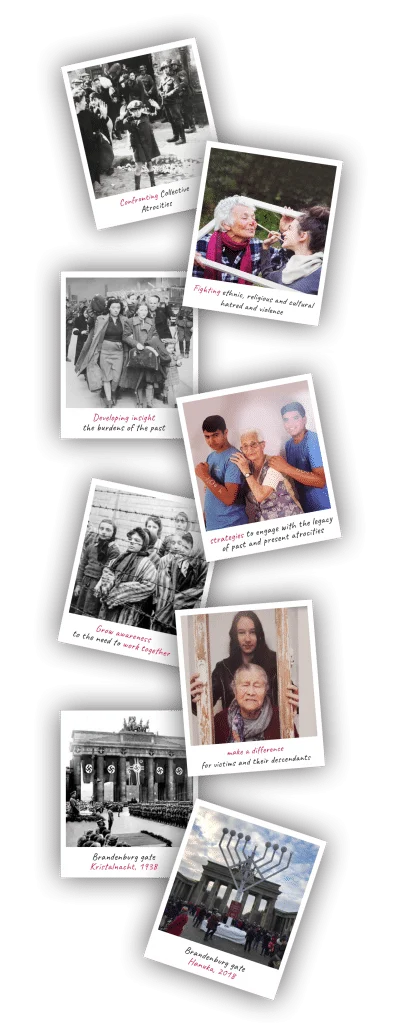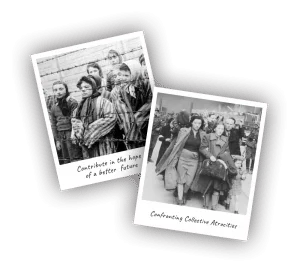The work of PCCA has a long and distinguished history. The original idea was proposed by a group of brave and visionary psychoanalysts, psychotherapists and group relations consultants in the mid 1980s who felt that a great opportunity for learning from experience about man’s inhumanity to man – in particular the instance of the Holocaust – was being avoided and this topic needed to be addressed with some urgency before personal, group and national defensive processes became so set in stone that learning was no longer possible. They accordingly set up a series of conferences, the first two held in Israel, the third in Germany and the next three in Cyprus. Whereas the first conferences focused specifically on German/Jewish/Israeli relationships, the last three conferences opened up the theme to a wider membership, for want of a better term called Others. The following conferences retained their roots in the events of the Holocaust and the learning that both staff and members have had from this work, but extended their work to specific groups, in this case Palestinians, as well as leaving the door open to membership of other groups that have similarly been caught up in processes of ill treatment and genocide.
The work of PCCA has a long and distinguished history. The original idea was proposed by a group of brave and visionary psychoanalysts, psychotherapists and group relations consultants in the mid 1980s who felt that a great opportunity for learning from experience about man’s inhumanity to man – in particular the instance of the Holocaust – was being avoided and this topic needed to be addressed with some urgency before personal, group and national defensive processes became so set in stone that learning was no longer possible. They accordingly set up a series of conferences, the first two held in Israel, the third in Germany and the next three in Cyprus. Whereas the first conferences focused specifically on German/Jewish/Israeli relationships, the last three conferences opened up the theme to a wider membership, for want of a better term called Others. The following conferences retained their roots in the events of the Holocaust and the learning that both staff and members have had from this work, but extended their work to specific groups, in this case Palestinians, as well as leaving the door open to membership of other groups that have similarly been caught up in processes of ill treatment and genocide.
Organising conferences with a given setting and methodology
Continuing to develop our own learning about this work
Writing articles
Publishing books
Giving presentations about experiential and theoretical aspects of our work
Developing a training programme which will enable others to gain expertise in this work
Supporting others to develop this kind of work, elsewhere.
Organising conferences with a given setting and methodology
Continuing to develop our own learning about this work
Writing articles
Publishing books
Giving presentations about experiential and theoretical aspects of our work
Developing a training programme which will enable others to gain expertise in this work
Supporting others to develop this kind of work, elsewhere.

The Holocaust appears to have cast a very long shadow, its most immediate impact being to poison the relationship between Germans and Jews. It was hoped that once the full extent of the genocide that lay at the heart of the Nazi project, together with details of the many levels of atrocity associated with it, were fully exposed, their sheer horror would contribute to a determination never again to allow such trains of events to be set in motion. Sadly, this hope has not been realized. Since the end of World War II we have witnessed worldwide, seemingly unstoppable cycles of inter-group hatred and violence – ethnic, religious and cultural. Are we doomed to repeat these destructive patterns endlessly, or is it possible to engage with the legacy of the past in such a way that it opens up the possibility of a better future.
Partners in Confronting Collective Atrocities is an organization that works towards developing strategies to engage with the legacy of past and present atrocities so as to open up possibilities for a more hopeful future. It grew out of the recognition of a group of German and Israeli psychoanalytic colleagues that their ability to relate to and to work with the Other was seriously constrained by the legacy of the Holocaust. Unconscious hatred on the part of victims and their descendants, and guilt on the part of the descendents of perpetrators, seemed to live on as insurmountable obstacles. Could a setting be devised where such forces could be engaged honestly and safely? Would such an engagement make a difference?
Experiential working conferences – sometimes referred to as The “Nazareth” Conferences after the venue of the first ones – began as a response to this challenge. The Tavistock Group Relations model, which integrates psychoanalytic and systems approaches, was specially adapted to create a setting in which experiences relating to the Holocaust that are ordinarily disowned could be discovered, voiced and comprehended. For each group the physical presence of the other served to bring to the fore complex and difficult feelings that included painful and entrenched group enmity, hatred, prejudice, cruel persecution and unbearable shame and guilt; once in the open they became available to be worked on. The work that takes place is therefore intensely personal, forging new bonds of trust across old divides, and allowing participants to examine the ways in which the legacy of the past, alive within, bedevils the current relationships of individuals and groups.
Developing insight into how the burdens of the past are alive within us, within the experiential conference setting, has helped many individuals to move on to a more hopeful future. We believe that such individual movement fosters group movement, and PCCA’s experiential conferences will continue to serve these aims. In addition to the German/Jewish core issues, however, there has been a growing awareness of the need to work on newly invoked enmities (e.g., Arab/Jew; Muslim/Jew-Christian; Palestinian/Israeli), which have particular urgency in light of the dangerous escalation of armed conflict in our world. The model we have developed has been used also to work on “the tense triangle” (Bar-On) of Germans, Israelis and Palestinians today, including Others, to shed light on what is going on, and to contribute towards building a better future.
The Holocaust appears to have cast a very long shadow, its most immediate impact being to poison the relationship between Germans and Jews. It was hoped that once the full extent of the genocide that lay at the heart of the Nazi project, together with details of the many levels of atrocity associated with it, were fully exposed, their sheer horror would contribute to a determination never again to allow such trains of events to be set in motion. Sadly, this hope has not been realized. Since the end of World War II we have witnessed worldwide, seemingly unstoppable cycles of inter-group hatred and violence – ethnic, religious and cultural. Are we doomed to repeat these destructive patterns endlessly, or is it possible to engage with the legacy of the past in such a way that it opens up the possibility of a better future.
Partners in Confronting Collective Atrocities is an organization that works towards developing strategies to engage with the legacy of past and present atrocities so as to open up possibilities for a more hopeful future. It grew out of the recognition of a group of German and Israeli psychoanalytic colleagues that their ability to relate to and to work with the Other was seriously constrained by the legacy of the Holocaust. Unconscious hatred on the part of victims and their descendants, and guilt on the part of the descendents of perpetrators, seemed to live on as insurmountable obstacles. Could a setting be devised where such forces could be engaged honestly and safely? Would such an engagement make a difference?
Experiential working conferences – sometimes referred to as The “Nazareth” Conferences after the venue of the first ones – began as a response to this challenge. The Tavistock Group Relations model, which integrates psychoanalytic and systems approaches, was specially adapted to create a setting in which experiences relating to the Holocaust that are ordinarily disowned could be discovered, voiced and comprehended. For each group the physical presence of the other served to bring to the fore complex and difficult feelings that included painful and entrenched group enmity, hatred, prejudice, cruel persecution and unbearable shame and guilt; once in the open they became available to be worked on. The work that takes place is therefore intensely personal, forging new bonds of trust across old divides, and allowing participants to examine the ways in which the legacy of the past, alive within, bedevils the current relationships of individuals and groups.
Developing insight into how the burdens of the past are alive within us, within the experiential conference setting, has helped many individuals to move on to a more hopeful future. We believe that such individual movement fosters group movement, and PCCA’s experiential conferences will continue to serve these aims. In addition to the German/Jewish core issues, however, there has been a growing awareness of the need to work on newly invoked enmities (e.g., Arab/Jew; Muslim/Jew-Christian; Palestinian/Israeli), which have particular urgency in light of the dangerous escalation of armed conflict in our world. The model we have developed has been used also to work on “the tense triangle” (Bar-On) of Germans, Israelis and Palestinians today, including Others, to shed light on what is going on, and to contribute towards building a better future.

© Copyright 2018 – 2022, All rights reserved. | Website and branding design by shoco marketing